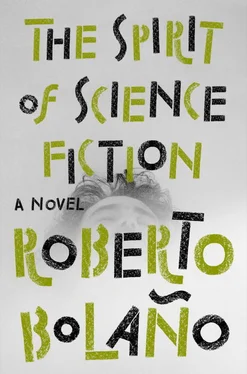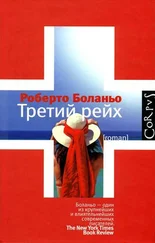“Ask me what books were in the grain shed.”
“Let’s hear it.”
“If we exclude the manuals and textbooks, all relating to the world of the potato, we are left with just one: The Paradoxical History of Latin America, by Pedro Huachofeo, B.A. in economics and M.D. in veterinary science, both degrees obtained at the University of Los Ángeles in the province of Bío-Bío. A five-hundred-page tome, lavishly illustrated by the author himself and full of stories, half of which don’t take place in Latin America.”
“The name sounds familiar.”
“Huachofeo, I should say, was the pseudonym of a scion of one of the richest landowning families, which disinherited him, of course. He was killed in a raid at a brothel down south.”
“Ah, always the violence. And the machismo. Why do our intellectuals have to be such creeps when it comes to sex?”
“You’re wrong. Huachofeo was there to receive a message. His contact didn’t show up, and the poor guy sat for a while talking to a pimp and sipping some tasty house red. Pure bad luck.”
“Uh-huh. The caretaker was a friend of Huachofeo’s, I suppose.”
“No—an admirer. Or a student of his work, if you prefer. The caretaker believed that the meanderings and ponderings of The Paradoxical History of Latin America were really signals in code. But let’s leave Dr. Huachofeo in his grave. As you’ll see, there are many coded messages. I’m telling you all this because the soul of the dead author, present in this book—the only nonacademic book read by the caretaker—roamed the academy, along with other ghosts. It was one of the guardian spirits of the academy. And that’s all. That’s the Potato Academy. Where Boris studied.”
“I’m going to get myself another vodka.”
“Bring me a tequila or whatever while you’re up.”
“Wonderful. Now you look happier.”
The name of the author of “Eros and Thanatos” was José Arco. Before the night was over, we were friends. The kids from the workshop asked me out for coffee, and José Arco came, too. I rode in one of the poets’ cars; he rode behind us—but also beside and sometimes ahead of us—on a black Honda. I was surprised: in those days, more and more motorcycles were turning up in poems, but there weren’t many poets on real motorcycles on real streets; also, as I could see from the car window, he rode in a particular way. Hardly the inscrutable biker, he made his presence known with hand signals and waves and cries, attuned not just to the nocturnal landscape but also, I could have sworn, to the ghosts—half vision and half apparition—that appear behind trees and on cracked sidewalks in the old neighborhoods of Mexico City. Later, when everyone had gone and he and I were still eating and drinking, he confessed that his motorcycle had broken down and that he was actually happy about it, since he was a walker by nature. I asked no questions until we left the bar. The motorcycle, in fact, wouldn’t start, and we decided to leave it parked in front of the house we liked best. Actually, it was he who asked me if I liked the looks of some houses that he pointed out not entirely at random as we pushed the motorcycle along, while at the same time begging me to be honest and not weasel out and choose any old house. The fourth received my nod of approval. This is where Teresa lives, he said with a smile. The street, José Arco, the motorcycle, me—together we formed a strange unit. Our shadows, too dark, stretched to a wizened and nearly leafless oak; from the distance came snatches of a song. I whispered, happy: Who is Teresa?
“A friend.”
“Let’s go see her and tell her we’ve left the motorcycle here.”
“No,” said José Arco, “she’ll realize in the morning, when she wakes up.”
“Call her on the phone, then.”
“No, it’s too late, let’s go.”
It didn’t take a genius to realize that he was in love and that the motorcycle parked in front of the house was some kind of offering. I didn’t say anything, and we walked away. Deep down I was incredibly happy to have chosen the house of the only person he knew in the neighborhood. From where we were in Colonia Coyoacán, it was blocks and blocks to my rooftop room, and there would be plenty of time to talk. At first José Arco wasn’t very communicative, or rather he was semicommunicative: he muttered incomprehensible things, assumed that you knew what he was talking about, had trouble explaining his stories, talked as if desperation and happiness were the same thing, a single territory, the site of his Language Academy and his homeland. And so, little by little, on this walk and later ones, he gave me a summary of his life. We were the same age, twenty-one. He had studied sociology and philosophy and hadn’t gotten a degree in either. An illness, which he didn’t like to talk about, had caused him to drop out of school. He had spent four months in the hospital. One morning a doctor told him that he should have been dead two weeks ago. José Arco said that then he leaned on one elbow and struck the doctor with a right cross, the first time he’d punched anybody. When he went back to school, his friends, who by now were in their second year, explained in some disappointment that all this time they’d thought he was in the mountains with the guerrilla troops of the Party of the Poor. He stuck it out for two days, and then he decided he’d had enough. At the time, he was living in a house in Satélite with his mother and his little brother, Gustavito, a six-foot-tall giant of a kid. I’ll have more to say about his mother later. There’s not much to tell about Gustavito: I think he wanted to study law, and maybe he’s a lawyer by now, though José tried more than once to convince him that he was the great hope of Mexican heavyweights, the avenger of Pulgarcito Ramos, just what Satélite needed to come out swinging and shut down the competition from Tepito and La Bondojito. His brother, benevolent and patient as only a two-hundred-pound adolescent can be, laughed and let him talk. I think José Arco loved his family much more than he let on. (His father is the invisible man in this story.) Then he enrolled in the philosophy department and began to go to class again almost every day. Like so many others, he hung out at film clubs and went to parties thrown by the heroes of the day. He found work as a proofreader at a publishing house and stopped going to class; this time he and the university parted ways permanently. He left home at nineteen, almost twenty, and spent his time rolling around Mexico City dreaming up weird projects, planning swift and meticulous scenes that left him suddenly exhausted, racked, straddling the motorcycle pulled to a halt wherever he happened to be, gripping the handlebars so as not to fall off. Thanks to him, I got to know the dens of San Juan de Letrán, the neighborhoods around Garibaldi where we sold Virgin of Guadalupe lamps on the installment plan, the chop shops of Peralvillo, the dusty rooms of Romero Rubio, the shady photography studios of Avenida Misterios, the hole-in-the-wall eateries behind Tepeyac that we reached by motorcycle as the sun was beginning to rise over the neighborhood, which looked just as cheerful and unsavory to us as we did to the women who served us pozole. Back then he was king of the frogs and I was ambassador of the rats, and our friendship and our schemes were in full swing. Many were the nights we spent in the rooftop room with Jan, whom he loved from the start. Sometimes he came by late, at three or four in the morning, waking us up with a long cry, like a wolf, and then Jan leaped up from his mattress, went over to the window, and said: it’s José Arco. Other times we were awake, reading or writing, and he came up with a bottle of tequila and three ham sandwiches, with Posada and Remedios Varo postcards for Jan’s correspondence, with poetry books and little magazines, with reports on the cloud, the eye that was advancing on Mexico City. Don’t scare me, I said. Jan laughed. He loved José Arco’s visits. José Arco sat down on the floor and asked me what article I was perpetrating for the Doll, and then he talked science fiction with Jan. The sandwiches, wrapped in brown paper, were enormous and full of everything: beans, tomato, lettuce, sour cream, avocado, chile pepper, and two slices of ham. The little bottle of tequila was finished before the sandwiches, and we would end the evening drinking tea, playing some radio show with the volume turned way down, reading poetry, Jan translating poems by Daniel Biga or Marc Cholodenko, whom José Arco would meet many years later, but that’s another story; at six thirty or seven, he said good-bye, took the stairs one by one, got on his Honda, and disappeared down Insurgentes. We went back to our mattresses and fell asleep, and sometimes I dreamed that José Arco was gliding on his black motorcycle along a frozen avenue, without a glance at the icicles that hung from the windows, shivering with cold, until suddenly, from a sky that was also white and frozen, came a blazing red lightning bolt, and houses and streets split apart, and my friend disappeared in a kind of hurricane of mud. When I woke up, it was usually with a sharp headache.
Читать дальше












